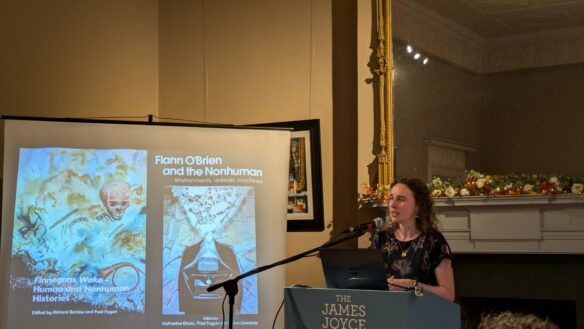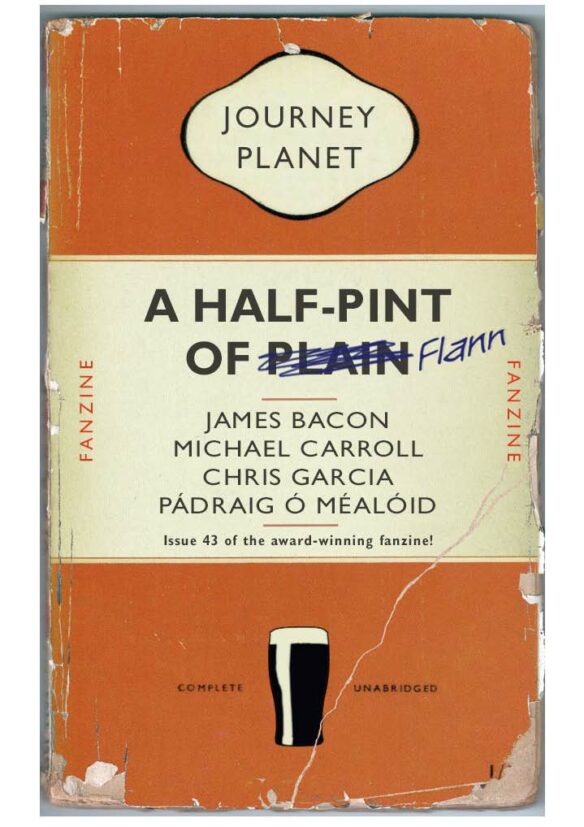
James Bacon is one of many whose works are published in two books launched today at the James Joyce Centre in Dublin. Flann O’Brien and the Nonhuman, from Cork University Press; edited by Katherine Ebury, Paul Fagan and John Greaney; and Finnegans Wake – Human and Nonhuman Histories from Edinburgh University Press; edited by Richard Barlow and Paul Fagan.
Irish writer Brian O’Nolan wrote under many pen names including Myles na gCopaleen and Flann O’Brien. James Bacon’s 7000-word chapter “For Steam Men, Myles na gCopaleen and Irish Rail” was published in the Flann O’Brien book, but the piece has had an interesting origin.

It started off in 2018 as “Off the Rails – Flann on Track,” an essay in in Journey Planet #43, the Flann O’Brien issue, co-edited with Christopher J Garcia, Michael Carroll, and Pádraig Ó Méalóid.
“From there, with encouragement from Pádraig and others, I took the step of expanding the piece, and developing it into a paper. Robert Cogger, a rail communications officer, David John Adams, a freight driver who also drove steam trains, both supported with contemporary and expert views of Flann O’Brien’s work.”
Work continued. O’Brien featured the railways in a variety of ways: the fictional with “John Duffy’s Brother,” where a clerk having a mental health moment takes solace in “becoming” a train, chuffing about the office; the partially fictional with “A Bash In the Tunnel,” which formed part of an editorial to a literary magazine, The Bell, when Myles na gCopaleen guest-edited a special issue on Joyce; again writing as Myles na gCopaleen, O’Brien’s satirical yet incisive reflection of reality through dozens of humorous articles for The Irish Times column, “An Cruiskeen Lawn,” which challenged the powers that be and advocated for the railways; to his script of TV comedy O’Dea’s your Man episode “Fresh Air,” set in a railway station signal box, featuring Jimmy O’Dea and David Kelly.
There is so much to draw upon. O’Brien wrote over 4000 columns for The Irish Times, in which he took the rail companies to task on a number of occasions, to such a degree that, at one stage, he raised the rail companies’ ire so much that a supplier demanded an apology from The Irish Times.
In 2019, James presented his paper “Off the rails: Flann an expert community advocate for rail transport” at Palimpsest: The V International Flann O’Brien Conference at University College Dublin. Before Covid, there had been a call for essays, and James was delighted when an expansion of his paper was welcomed.
“Researching during Covid was a personal relief to the realities of heading into Paddington to drive trains during a time of such fear. The isolation in the spring and early summer of 2020, allowed for much work, and like the trains, the post flowed as support came from many quarters. My writing grew, as I came to understand more as I engaged with a series of experts, including fellow train driver Noel Playfair of the NIR who drove steam trains for the RPSI and was the last person to drive the Slieve Gullion, a steam train which Myles na gCopaleen wrote about. Nelson Poots in the Railway Preservation Society of Ireland also proved hugely helpful, while the resources of the Irish Railway Record Society were made available thanks to Gerald Beesley and the loan of HCA Beaumont Archive materials from Johnathan Beaumont. It was a busy time.
“The expanded work was ginormous, and too much. Indeed an early draft exceeded 12,000 words. From this though, with the support of the patient editors, the work was edited down to about 7000 words for this publication, which I’m delighted to say has been well received so far.”




The editors’ introduction notes:
“James Bacon explores O’Nolan’s interactions with trains and railways in his persona as the ‘steam man’ Myles na gCopaleen. As a working train driver himself, James demonstrates from a historicist and practitioner’s perspective how an appreciation of O’Nolan’s deep and broad knowledge of the railways, stations and institutions of Ireland – and, indeed, his professional-level technical, mechanical and operational understanding of and interest in the trains themselves – is crucial to understanding the specifics of his interconnected political, economic and ecological critiques of the Irish state. While previous critics have read the railway imagery in O’Nolan’s fiction in terms of literary allusion and metaphor, this essay historicises key columns from Cruiskeen Lawn in which O’Nolan’s real expertise in Irish rail is key to his engagement with a diversity of interconnected themes ranging from war and natural resources to language politics and modernisation. Whether presenting fantastic, cyborgian images of human-train hybrids or flaunting his local and insider knowledge to bolster his polemics in the daily paper, James shows us how O’Nolan’s interventions are always supported by a real and detailed knowledge of the underlying technical and operational details that shaped debate, as he promotes good practice and progression with evident affinity and respect for the machines themselves.”
“I keep laughing at my title,” says James, “as ‘The Steam Man’ is a method for Flann to either insert himself into the narrative as an expert, claiming footplate experience, or to create a humourous situation with the Steam Man, an archetypal older train fan, who is possibly an operator of old, but maybe just nerdy and needy. The Steam Man has a nugget of expertise but often lectures the Train Drivers annoyingly, and always knows best…and who is a piece of writing for, if not the author themselves.”
“There is an agility to how Flann uses language and monikers to suit the argument, and I think that could be a chapter on its own. But I laugh hard, because I think of the Steam Men in Fandom: a danger and concern to either powers that be or the community of hard working expert practitioners.”
“Thanks must go to Gerald Beesley, editor of the Irish Railway Record Society Journal, Paul McCann and Nigel Poots (sadly since passed) of the Railway Preservation Society, Jonathan Beaumont for access to the HCA Beaumont archive, and David John Adams for insight from his steam engine days. Much thanks also to Pádraig Ó Méalóid for continuous encouragement, assistance, other verbs and support. The essay is dedicated to: Robert Cogger, formerly of Railway Communications at Thameslink and Chiltern Railways, who departed for the final time December 2019; to Noel Playfair who passed away in 2023, leaving a huge gap in the cab and on the footplate of NIR and the RPSI; and to John Wyse Jackson of Zozimus Bookshop whom we, who love Myles, will miss. All of whom were generous with patience, their time and understanding, (“repeat back”) and helping me to gain a clear comprehension of challenging matters during a challenging time.”
Journey Planet continues to strive to bring new writing to a broader audience, and while James was in Dublin for the book launch, the final articles for a “LGBTQ+ and Comics” issue with co-editor David Ferguson were being finalized. The issue is due out next week.
James also conducted research at the National Library of Ireland on aspects relating to Bram Stoker’s Dracula, looking at early critique of the work and staying with the railway connection for a continually-expanding article by James entitled “Train Fiend” due to appear in the forthcoming Journey Planet issue on Dracula, due out on the 6th of November.
James’s chapter, “For Steam Men, Myles na gCopaleen and Irish Rail,” is available in Flann O’Brien and the Nonhuman from Cork University Press; edited by Katherine Ebury, Paul Fagan and John Greaney.
Journey Planet #44 “Flann O’Brien” is available here.

Discover more from File 770
Subscribe to get the latest posts sent to your email.

Mm… I think it was indeed Flann (sometimes called Myles na gCopaleen) who composed the now immortal phrase : “a pint of plain is your only man”.. (He was referring to plain porter-a close relation in alcoholic terms to stout…!!) best wishes